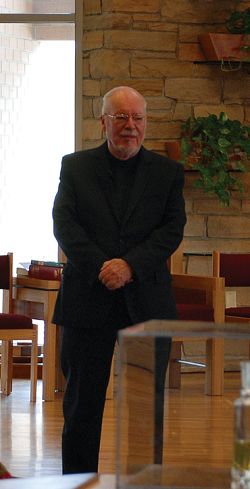Saint Catherine of Siena/Newman Center presents the annual Aquinas lecture with speaker Ron Austin

SALT LAKE CITY — As part of the annual Aquinas lecture, "Faith Meets Popular Culture: A Long Shot" was presented at Saint Catherine of Siena/Catholic Newman Center last weekend. This year the lecture was presented by Ron Austin, for whom dozens of Catholics gathered to listen as well as to ask questions. Austin, a convert to Roman Catholicism who now lives in Eden, Utah, has been a writer and producer in Hollywood for over 50 years. His work includes feature films and television shows such as "Charlie’s Angels" and "Mission: Impossible." He is a founding member of Catholics in Media, chairman of the Windhover Forum and the author of "In a New Light: Spiritually" and "Peregrino: A Pilgrim Journey into Catholic Mexico." In addition, he has directed a Catholic Charities program for homeless men and served as volunteer prison chaplain. Recently he was inducted into the College of Fellows of the Dominican School of Philosophy and Theology in Berkeley. Austin said he was doubly appreciative of being asked to be a speaker in the lecture series. "First, because I am not a philosopher or a theologian, and I am also challenged to speak in the context of St. Thomas of Aquinas," he said. Austin addressed the topic of where Christians stand in the popular culture and mass media. He gave a historical view of religion and secularism in society, starting with what he said are three converging crises. "The first is the end of modernity, or the modern world as an historical period," he said. "And, with that close, the loss of many reassuring assumptions that we held in common as a culture until recently. Some people understand that we are still clinging to these assumptions and I will try to review that resistance, I hope gently, as I go. The second significant development is the mass migration of peoples all over the world. We in America are viewing this – and I think we’re viewing this somewhat narrowly – as a political and economic question. Now, of course, those are very serious issues. All mass migrations bring those kinds of problems with them, but I think in the long run the impact of this migration, which is happening all over the world with millions of people, will ultimately be cultural, spiritual and religious. Those are the questions we are going to have to address." During the lecture, Austin didn’t touch much on this second point; he said he addressed it in his most recent book, "Peregrino." The third development, he said, is the loss of the traditional ancient principal of condemning others as a way of unifying ourselves. Understanding the role the media plays in offering a target – something that we can hate and deplore – is necessary, he said. The most common format for this is in war, he explained. Some of the consequences of the end of modernity as a historical period are the loss of the goals of individual autonomy and self-defining freedom, the desire for absolute power over nature, and the assurance of unending material progress, he said. Modern political leaders "understand that they have lost a moral authority that cannot be replaced by material gains or regained even by sound policies," he said. "This unprecedented loss of credibility is primarily due to the failure of late modern society to find alternatives to religious solutions, and worse, the temptation to seek solace in an escape from reality rather than face the painful effects of repentance." The end of modernity "has left us in a cultural desert without – at the moment, at least – a reliable map," he said, adding that a secular society can’t meet people’s spiritual needs.
© Copyright 2024 The Diocese of Salt Lake City. All rights reserved.

Stay Connected With Us